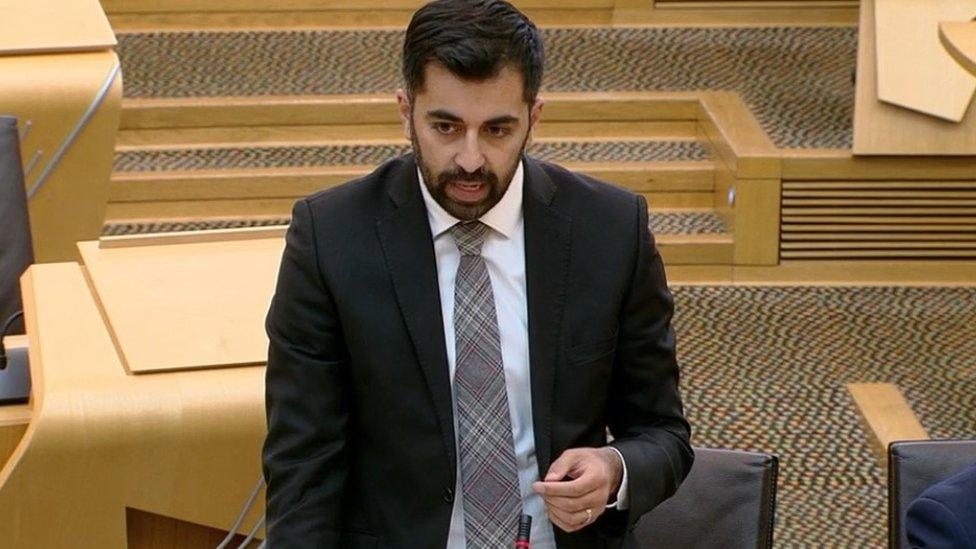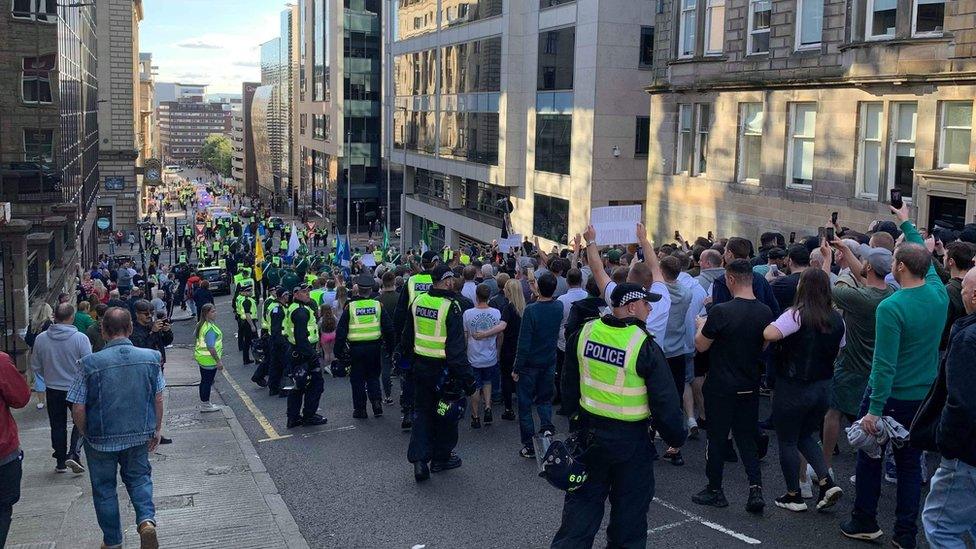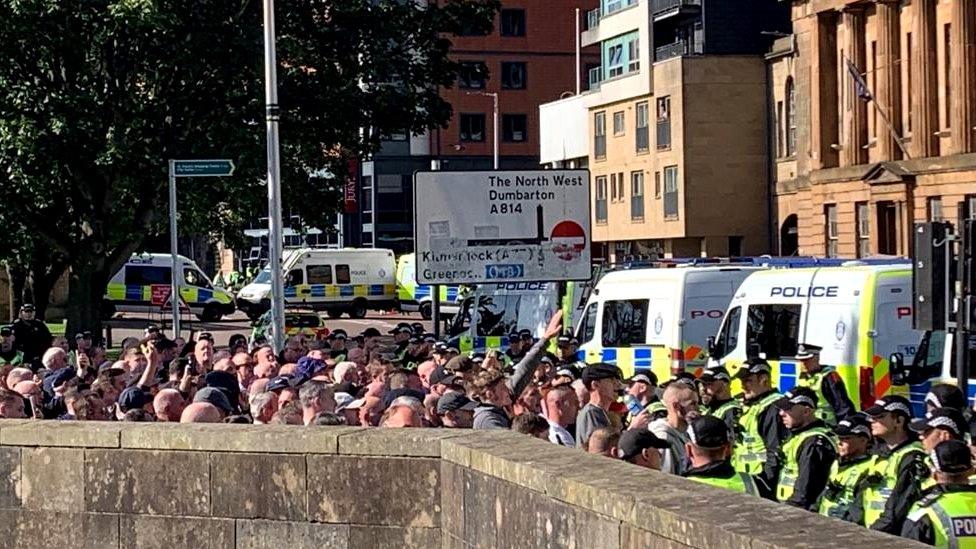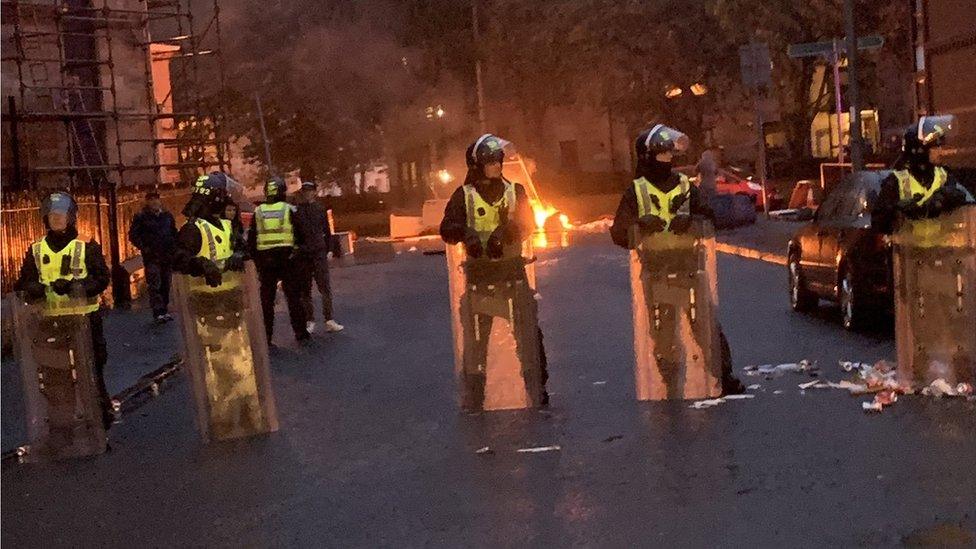Glasgow march violence 'stain on city's reputation', says minister
- Published

A counter-protest on the Broomielaw as a Republican march was held in Glasgow on Saturday
Justice Secretary Humza Yousaf has said the people of Glasgow have had enough of marches that lead to "sectarian violence" on their streets.
Mr Yousaf said the vast majority of the city's population viewed the trouble stemming from the marches as a "stain" on the city's reputation.
The minister was responding to a topical question at Holyrood after a second weekend of disorder.
He said the city council was looking at ways of reducing the number of marches.

Humza Yousaf said the people of Glasgow had had enough
On Saturday, a police officer was injured as two Irish Republican marches and counter-demonstrations were held in Glasgow.
The counter demonstrations at both marches were quickly contained by police, who had deployed officers in riot gear and mounted police.
The heavy police presence came a week after a riot developed in Govan when Loyalists tried to disrupt another Irish Republican parade.
In the aftermath of the trouble in Govan, First Minister Nicola Sturgeon condemned the "sectarian disruption" as "utterly unacceptable".

About 1,000 people were involved in the marches and the counter protests
Glasgow City Council said it planned to stop "morons intent on bringing mayhem to the streets of our city".
However, in the next three weeks there will be nine marches by Loyalist organisations and two Republican marches in the city of Glasgow.
In the Scottish Parliament, Mr Yousaf said the events of the past two weekends had clearly demonstrated that sectarian violence was "not a thing of the past".
He said the right to parade peacefully was a legal right and an important part of a democracy that values free speech.
But he said it was being abused by those intent on denying others a voice.

Mr Yousaf said there was "no simple solution" and all the options, including legislation, were on the table.
The justice secretary said: "It does frustrate me, quite a lot frankly, that we are having to talk about legislation for disorder that is committed by grown men in 2019 in a multi-cultural city like Glasgow, when they are fighting battles of centuries gone by.
"I think the fact you have to think about legislating to stop these individuals from committing that disorder is a pretty depressing state."
The topical question was raised by SNP MSP John Mason, who argued the number of demonstrations should be reduced.

September's loyalist and republican marches
Saturday 14
Pride of the North Flute Band - starts 11.15am - 60 expected participants
Bridgeton Protestant Boys Flute Band - starts 12pm - 300 participants
Republican Network for Unity - starts 1pm - 150 participants
Whiteinch Orange and Purple District 7 - starts 2pm - 120 participants
Sunday 15
Partick Orange and Purple District 15 - starts 1.45pm - 60 participants
Saturday 21
Independent Loyal Orange Order - starts 10am - 50 participants
Pride of Govan Flute Band - starts 10am - 800 participants
Drumchapel Orange and Purple District 57 - starts 11am - 120 participants
Springburn Campsie Apprentice Boys of Derry - starts 12pm - 60 participants
West of Scotland Band Alliance - starts 12.30pm - 200 participants
Friday 27
Govan Somme Association - starts 6.15pm - 100 participants

'Banning the marches'
Earlier, Mr Mason told BBC Radio's Good Morning Scotland programme: "If there's 14 and if about nine or 11 of them are Loyalist organisations, do they really need that number, or could it be one?"
Of the marches planned in Glasgow during the rest of the month, four are expected to take place on Saturday while five are scheduled for the following Saturday, including the 800-strong Pride of Govan Flute Band procession.
Mr Mason said that if there were to be a referendum among the people of Glasgow, a majority would likely vote in favour of banning the marches.
Meanwhile, BBC Scotland revealed that it cost about £300,000 to provide 500 specialist public order officers to the two demonstrations at the weekend.
The Scottish Police Federation said that did not include other resources such as the force helicopter, mounted officers and conventional police.
- Published8 September 2019

- Published31 August 2019
